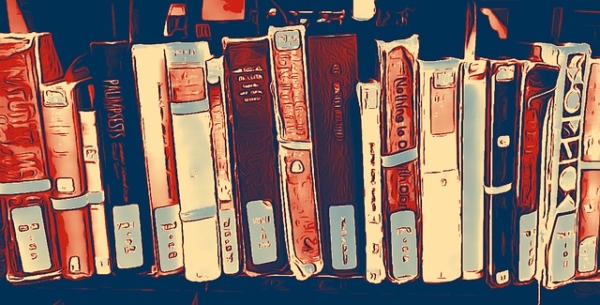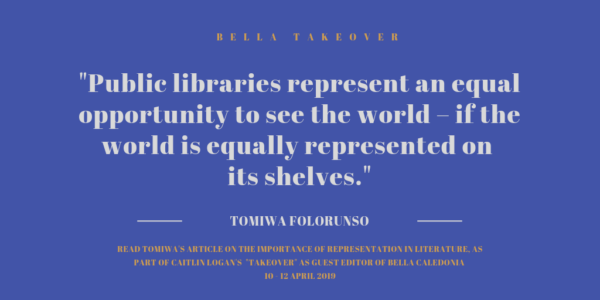A letter to the library: An equal opportunity to see the world?


Reading is my ultimate form of escapism. A good book is as comforting as a conversation with a good friend. Each period of my life can be represented by a book. A good story is an opportunity to put on another person’s shoes and forget about your own. Books showed me possibilities, alternative routes and other lives, travelling time and the world from the back seat of the car, or buried underneath my duvet cover until the early hours.
Reading gave me an empathy for others and access to a vocabulary without which I think I would be unable to articulate myself the way I do. The benefits of books and reading are not unknown – there are countless studies out there that all come to the same conclusion in different words: reading is good for you.
To say reading was encouraged in my home would be an understatement to say the least. I should admit now, that I am biased. My mum is a librarian and I probably knew the dewy decimal system before I could spell my surname. Coming from a Nigerian – and very academic – household, reading represented access to information and knowledge, a self-education, and by unspoken extension, a way to elevate yourself. I would receive books and tokens for Christmas, birthdays and occasionally as a treat. The majority of the books I read growing up, though, all came from the same home: the library.
The public library, next door to my primary school and one street down from my childhood home in Edinburgh. It represented a safe haven. A place of familiarity when we moved out of the area and to the north of the city. Even now when I find myself in that part of Edinburgh, I smile fondly at the building. I have moved on, but it remains the same.
I mention my public library because at a time of budget cuts and threats of closure, it is important to pay dues when they are due. Without the existence of public libraries, where you can borrow books free of charge, I never would have been able to read as much as I did, which hindsight allows me to appreciate. Libraries level the playing field, in a sense; an attempt to provide equal access to information in a society where the cost of education keeps increasing.


I have been quick to shout for better representation in many areas, but I seem to have forgotten the importance of this in the literary world. As children and teenagers who are not the majority in this country – white, able-bodied, straight and cisgender – you want to be seen. You need to be seen. Because being seen allows you to legitimise your experience, to effectively situate yourself and your identity in the world. There was little to none in terms of diversity, in either authors or stories, on the first or second row of my local library shelves. There were, however, copious copies of every single Harry Potter and enough Jacqueline Wilson to last a lifetime.
That was about ten years ago, and so I wanted to believe, but was not hopeful, that things had changed. As an experiment, I ran a search on the Edinburgh City Council online library catalogue. Two books, both adapted and released as films in 2018. One, The Children Act, was written by an English white man, Ian McEwan. The second, If Beale Street Could Talk, was written by a gay African American from New York, James Baldwin. My search found that, across Edinburgh public libraries, there are seventeen copies of The Children Act and just one copy of If Beale Street Could Talk. I felt that my point had been proven.
As a free resource, public libraries represent an equal opportunity to see the world – if the world is equally represented on its shelves. The importance of the library as a community space is continuously used in the narrative supporting its preservation. According to Carnegie Trust research from 2016, 85 per cent of library users said the library was important to the community, although only 58 per cent said it was important to them personally. I question how important a space can be to the community if it does not truly represent them.
To look at Glasgow Women’s Library as an example, the community they have created is integral to their success – a community that is accessible and inclusive. A community which allows women to have a space among the books and on the shelves where they feel empowered, supported, welcomed, and seen as individuals.
I feel incredibly privileged to have been able to foster a love of books and reading that began at home and was sustained through access to a public library. Libraries are vital, but only if they continue to evolve, and the shelves represent the communities they are serving.
Recommended reading
Here are some books from my own shelves which I’d recommend. Why not see if your local library has a copy, or request one if they don’t?
Fiction
• Homegoing by Yaa Gyasi
• Stay With Me by Ayobami Adebayo
• When We Speak of Nothing by Olumide Popoola
• Things Fall Apart by Chinua Achebe
• The Underground Railroad by Colson Whitehead
• If Beale Street Could Talk by James Baldwin
Non-fiction
• Why I’m No Longer Talking to White People About Race by Reni Eddo-Lodge
• Slay In Your Lane: The Black Girl Bible by Elizabeth Uviebinené and Yomi Adegoke
• She Called Me Woman: Nigeria’s Queer Women Speak by Azeenarh Mohammed (Editor), Chitra Nagarajan (Editor), Aisha Salau (Editor)
• Revolting Prostitutes by Juno Mac and Molly Smith
• The Colour of Madness: Exploring BAME mental health in the UK by Samara Linton (Editor), Rianna Walcott (Editor)
• Let Me Tell You This by Nadine Aisha Jassat (Poetry)

My essential reading? Gramsci’s Prison Notebooks, anything by Eric Hobsbawm but especialally his four volume ”Ages” series, Shakespeare’s The Tempest and Pride and Prejudice by Jane Austin for its sheer intelligence.In the case of Shakespeare readers may want to note that the bosun and Caliban propoise collectivist solutions to the storm at sea and the owneship of Caliban’s enchanted isle.
My essential reading? Gramsci’s Prison Notebooks, anything by Eric Hobsbawm but especialally his four volume ”Ages” series, Shakespeare’s The Tempest and Pride and Prejudice by Jane Austin for its sheer intelligence.In the case of Shakespeare readers may want to note that the bosun and Caliban propose collectivist solutions to the storm at sea and the owneship of Caliban’s enchanted isle repectively.
I enjoyed reading this but the part that really did it for me is the Recommended Reading. You deal with a subject that’s been raised but still need to be raised, as there has been no real change.
Focusing on the point about (appropriate) reading fostering empathy, I am concerned whenever I hear that a young person who can read, chooses not to. I’m not aware of any other media that helps to develop a theory of mind broad enough to take in strange cultures in the way long-form text does. That puts you into the mind of someone else. That can develop another person’s worldview and some of their reasons and unreasons for it.
Some of our current problems appear to be exacerbated by people getting learning political philosophy from YouTube. I remember struggling with concepts and repeatedly rereading passages of key works until I felt I had a working understanding. While other media may be helpful, and new media is still to deliver more developed forms, there does not seem to be a substitute for reading as yet.
I have two of the books listed, one from each group, on my to-read shelves. I have very recently requested a copy of a book recommended by someone on a course, and was pleased that my local library was able to provide it in short order, with notification by email. Are the book-buying policies of public libraries themselves public? I have wondered in the past about the effects of sponsorship, and whether indeed institutions like the Carnegie Trust can be, well, trusted.
When a teenager in Glasgow in the 1950s, libraries directed me toward assisting important social and political actions. However, Scottish nationalist organizations proved unable to support multiple concepts; with others I was forced to leave our land (you can learn about my predicament in RETIRED TERRORIST). I first went to Occupied Germany, founding the knowledge I had gained in Scottish libraries and schools proving very useful for obtaining appointments with American military work a well as German authorities. After a year I was offered immigration to the US, and subsequently entered California university programs. After these qualifications I got appointments as a library director. During this time, attempting to maintain my Scottish connections, I also found myself being told that my ‘radical nationalist’ background would place me at risk if I should try to return home! So decided I’d be better to take advantage of my ‘radical library viewpoints’ in the US – finding many Americans sympathetic to the idea that libraries should be active in promoting intellectual freedom (“hippies” were being identified as American conservatives’ evil). I then wrote another book, RUNNING A MESSAGE PARLOR, telling about ventures I’d experienced in various parts of the US, when I’d defend everything from cowboys who wanted access to PLAYBOY, to setting up public poetry that included Burns material! Of course… I wasn’t successful! The library profession did defend me a little (my stuff was included in a manual, SOCIAL RESPONSIBILITIES AND LIBRARIES), but I couldn’t face any more fighting. I quietly took another academic position – in NZ – until I retired in 1999. Kiwis haven’t seem to have found much to complain about me excepting perhaps that I’m still a wee bit too Scottish!